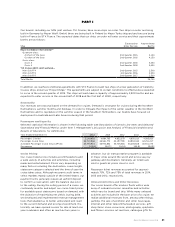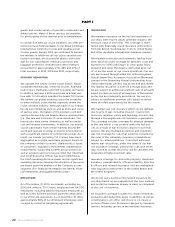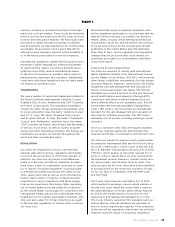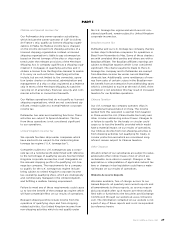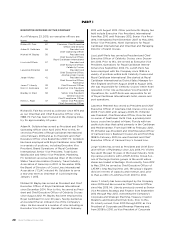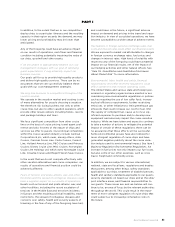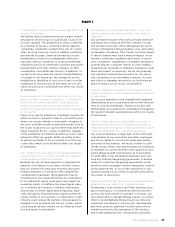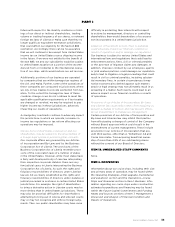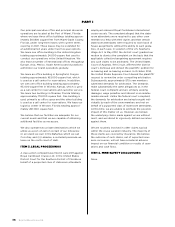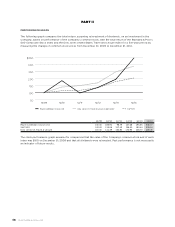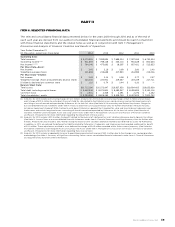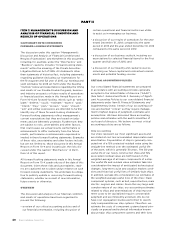Royal Caribbean Cruise Lines 2014 Annual Report Download - page 32
Download and view the complete annual report
Please find page 32 of the 2014 Royal Caribbean Cruise Lines annual report below. You can navigate through the pages in the report by either clicking on the pages listed below, or by using the keyword search tool below to find specific information within the annual report.
Royal Caribbean Cruises Ltd. 31
PART I
In addition, to the extent that we or our competitors
deploy ships to a particular itinerary and the resulting
capacity in that region exceeds the demand, we may
lower pricing and profitability may be lower than
anticipated.
Any of the foregoing could have an adverse impact
on our results of operations, cash flows and financial
condition including potentially impairing the value of
our ships, goodwill and other assets.
If we are unable to appropriately balance our cost
management strategies with our goal of satisfying
guest expectations, it may adversely impact our
business success.
Our goals call for us to provide high quality products
and deliver high quality services. There can be no
assurances that we can successfully balance these
goals with our cost management strategies.
We may lose business to competitors throughout the
vacation market.
We operate in the vacation market and cruising is one
of many alternatives for people choosing a vacation.
We therefore risk losing business not only to other
cruise lines, but also to other vacation operators, which
provide other leisure options including hotels, resorts
and package holidays and tours.
We face significant competition from other cruise
lines on the basis of cruise pricing, travel agent pref-
erence and also in terms of the nature of ships and
services we offer to guests. Our principal competitors
within the cruise vacation industry include Carnival
Corporation & plc, which owns, among others, Aida
Cruises, Carnival Cruise Line, Costa Cruises, Cunard
Line, Holland America Line, P&O Cruises and Princess
Cruises; Disney Cruise Line; MSC Cruises; Norwegian
Cruise Line Holdings Ltd. which owns Norwegian Cruise
Line, Oceania Cruises and Regent Seven Seas Cruises.
In the event that we do not compete effectively with
other vacation alternatives and cruise companies, our
results of operations and financial position could be
adversely affected.
Fears of terrorist and pirate attacks, war, and other
hostilities and the spread of contagious diseases could
have a negative impact on our results of operations.
Events such as terrorist and pirate attacks, war, and
other hostilities, including the recent escalation of
tensions in the Middle East and terrorism incidents
in Europe, and the resulting political instability, travel
restrictions, the spread of contagious diseases and
concerns over safety, health and security aspects of
traveling or the fear of any of the foregoing have had,
and could have in the future, a significant adverse
impact on demand and pricing in the travel and vaca-
tion industry. In view of our global operations, we have
become susceptible to a wider range of adverse events.
Fluctuations in foreign currency exchange rates, fuel
costs and interest rates could affect our financial results.
We are exposed to market risk attributable to changes
in foreign currency exchange rates, fuel prices and
changes in interest rates. High levels of volatility with
respect to any of the foregoing could have a material
impact on our financial results, net of the impact of
our hedging activities and other natural offsets. See
“Item 7A. Quantitative and Qualitative Disclosures
About Market Risk” for more information.
Environmental, labor, health and safety, financial
responsibility and other maritime regulations could
affect operations and increase operating costs.
The United States and various state and foreign gov-
ernment or regulatory agencies have enacted or are
considering new environmental regulations or policies,
such as requiring the use of low sulfur fuels, increas-
ing fuel efficiency requirements, further restricting
emissions, or other initiatives to limit greenhouse gas
emissions that could increase our cost for fuel, limit
the supply of compliant fuel, cause us to incur sig-
nificant expenses to purchase and/or develop new
equipment and adversely impact the cruise vacation
industry. While we have taken and expect to continue
to take a number of actions to mitigate the potential
impact of certain of these regulations, there can be
no assurances that these efforts will be successful.
Some environmental groups have also lobbied for
more stringent regulation of cruise ships and have
generated negative publicity about the cruise vaca-
tion industry and its environmental impact. See Item 1.
Business-Regulation-Environmental Regulations. An
increase in fuel prices not only impacts our fuel costs,
but also some of our other expenses, such as crew
travel, freight and commodity prices.
In addition, we are subject to various international,
national, state and local laws, regulations and treaties
that govern, among other things, safety standards
applicable to our ships, treatment of disabled persons,
health and sanitary standards applicable to our guests,
security standards on board our ships and at the ship/
port interface areas, and financial responsibilities to
our guests. These issues are, and we believe will con-
tinue to be, an area of focus by the relevant authorities
throughout the world. This could result in the enact-
ment of more stringent regulation of cruise ships that
could subject us to increasing compliance costs in
the future.


